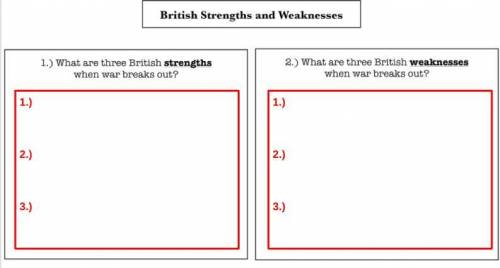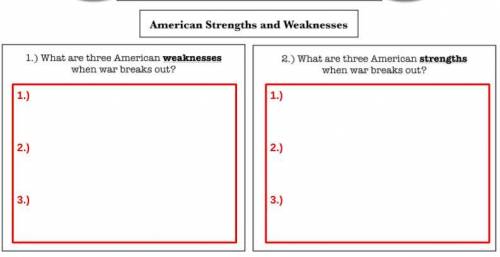
Mathematics, 04.12.2020 21:50 lcyaire
CAN SOMEONE PLEASE HELP ME WITHOUT TAKING MY POINTS: Please read and answer
When the Revolution began the Americans were already in a
weak position. They had scrambled to put together an army
(albeit not well-trained) and a tiny, ineffective navy. While
strengths were hard to find, their weaknesses were obvious.
Th e 1 3 Colo nies
First and foremost, the colonists lacked a stable government or
even a written constitution. The Articles of Confederation, the first
government of the United States, was not adopted until 1781, almost
five years into war. As a result the colonies were not well organized and
were often in disagreement on what decisions to make; the Continental
Congress debated often, but were very slow to take action even in
moments of dire need. General Washington often complained to
Congress on its inability to provide a regular fighting force. To make
matters worse, this inexperienced fighting force rarely had the
supplies needed to fight. Inadequate firearms, gunpowder, and
clothing plagued the army wherever it traveled. During the winter of
1777-78, Washington would comment on the pathetic state of his
Continental Army and their lack of shoes when he said his soldiers
could be tracked there by “following the blood in the snow.”
The American Revolution
While faced with a host of weaknesses, it was not all bad news for the colonists. One powerful
strength they possessed was the will and spirit of the American people. The desire to give their lives
to defend their homes, support a just cause, and thrust off the chains of oppression inspired a weak
fighting force to continue when things looked grim. Second, the colonists had George Washington,
arguably the greatest general in the entire war. Washington was a brilliant strategist, was popular
among his soldiers, and the knowledge he gained as a general in the British ranks would prove
essential in this war. Third, the colonists had the home-field advantage. They knew the hills, valleys,
and the overall lay of the land; this knowledge would favor them in a war. Finally, Washington's
admiration of young general Alexander Hamilton led to some very effective methods, such as using
spies throughout New York City when the British occupied the area.
The British Empire
When war began in 1776, Great Britain held a supreme advantage in a variety of areas. While it
fluctuated throughout the war, the British army was usually around four times the size of the
Continental army; this should be of no surprise, considering the colonists had little time to create an
organized fighting force. Second, the British army was a professional army, unlike the colonists who
had a citizens army (the British soldiers were trained to fight, whereas the Continental Army was
made up of farmers who were fighting “in their free time”). Too, the British maintained an
experienced navy, something the colonists could not match when the war began. Lastly, the wealthy
British empire had a seemingly endless supply of weapons and gear to ensure their soldiers were
well-fed, well-equipped, and well-prepared.
This is not to say that Great Britain was untouchable; they just faced a different set of problems than
the colonies. In the late-18th century, Great Britain’s claim in North America was just one of many
places in the world that required their attention. As a result, the British were pulled in many
directions at once. Second, the British often relied on outdated information since messages were slow
to relay from London. Third, Britain would fight over 3,000 miles from home -- it is very difficult to
keep the people at home interested in winning a war that they see no attachment with. Finally, even
though soldiers have been in the colonies since the French and Indian War, the colonists hold the
advantage since this is their home turf; it is very difficult to win a war when you are on enemy soil.



Answers: 3


Another question on Mathematics

Mathematics, 20.06.2019 18:02
Asoccer ball manufacturer wants to estimate the mean circumference of soccer balls within 0.1 in
Answers: 1

Mathematics, 21.06.2019 15:00
Sienna planned a trapezoid-shaped garden, as shown in the drawing below. she decides to change the length of the top of the trapezoid-shaped garden from 32 ft to 24 ft. which expression finds the change in the scale factor?
Answers: 1

Mathematics, 21.06.2019 15:00
Jeffery conducted a survey in his school and found that 30 of the 50 eighth grade students' favorite subject is mathematics. based on the results, jeffery concluded that out of the 200 students in his school, 120 students' favorite subject is mathematics. select the statement that is true about jeffery's conclusion. a. jeffery's conclusion is not valid because the sample was biased since only 200 students were surveyed. b. jeffery's conclusion is valid because the sample was random since all of the students were eighth grade students. c. jeffery's conclusion is valid because the sample was random. d. jeffery's conclusion is not valid because the sample was biased since all of the students were eighth grade students.
Answers: 2

Mathematics, 21.06.2019 19:30
Which describes the difference between the graph of f(x)=x^2 and g(x)=-(x^2-2)
Answers: 1
You know the right answer?
CAN SOMEONE PLEASE HELP ME WITHOUT TAKING MY POINTS: Please read and answer
When the Revolution beg...
Questions


Biology, 19.08.2019 23:30

English, 19.08.2019 23:30

Biology, 19.08.2019 23:30

Physics, 19.08.2019 23:30



Mathematics, 19.08.2019 23:30

History, 19.08.2019 23:30

Mathematics, 19.08.2019 23:30

Biology, 19.08.2019 23:30

Social Studies, 19.08.2019 23:30

Physics, 19.08.2019 23:30

History, 19.08.2019 23:30


History, 19.08.2019 23:30

Biology, 19.08.2019 23:30

Chemistry, 19.08.2019 23:30


Biology, 19.08.2019 23:30



